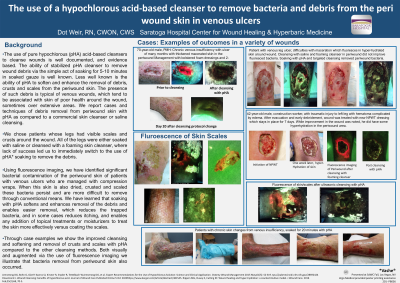Case Series/Study
(CS-170) The Use of Hypochlorous Acid Based Cleansers to Remove Debris from the Peri Wound Skin in Venous Ulcers
Friday, May 2, 2025
7:45 PM - 8:45 PM East Coast USA Time

Introduction: The use of pure hypochlorous (pHA) acid based cleansers to cleanse wounds is well documented, and evidence based. The ability of stabilized pHA cleanser to remove wound debris via the simple act of soaking for 5-10 minutes in soaked gauze is well known. Less well known is the ability of pHA to soften and enhance the removal of debris, crusts and scales from the periwound skin. The presence of such debris is typical of venous wounds, which tend to be associated with skin of poor health around the wound, sometimes over extensive areas. We report some cases and techniques of debris removal from periwound skin with pHA as compared to a commercial skin cleanser or saline cleansing.
Methods: We chose six patients whose legs had visible scales and crusts around the wound. All of the legs were either soaked with saline or cleansed with a foaming skin cleanser, where lack of success led us to immediately switch to the use of pHA soaking to remove the debris.
Results: Through case examples we show the improved cleansing and softening and removal of crusts and scales with pHA compared to the other cleansers to pHA. The methodology is augmented via the use of fluorescence imaging to illustrate that bacteria removal from periwound skin also occurred.
Discussion: Through the use of fluorescence imaging, we have identified significant bacterial contamination of the periwound skin of patients with venous ulcers who are managed with compression wraps. When this skin is also dried, crusted and scaled these bacteria persist and are more difficult to remove through conventional means. We have learned that soaking with pHA softens and enhances removal of the debris and enables easier removal, which reduces the trapped bacteria, and in some cases reduces itching, and enables any addition of topical treatments or moisturizers to treat the skin more effectively versus coating the scales.
Methods: We chose six patients whose legs had visible scales and crusts around the wound. All of the legs were either soaked with saline or cleansed with a foaming skin cleanser, where lack of success led us to immediately switch to the use of pHA soaking to remove the debris.
Results: Through case examples we show the improved cleansing and softening and removal of crusts and scales with pHA compared to the other cleansers to pHA. The methodology is augmented via the use of fluorescence imaging to illustrate that bacteria removal from periwound skin also occurred.
Discussion: Through the use of fluorescence imaging, we have identified significant bacterial contamination of the periwound skin of patients with venous ulcers who are managed with compression wraps. When this skin is also dried, crusted and scaled these bacteria persist and are more difficult to remove through conventional means. We have learned that soaking with pHA softens and enhances removal of the debris and enables easier removal, which reduces the trapped bacteria, and in some cases reduces itching, and enables any addition of topical treatments or moisturizers to treat the skin more effectively versus coating the scales.

.jpg)